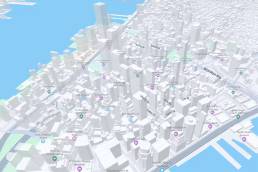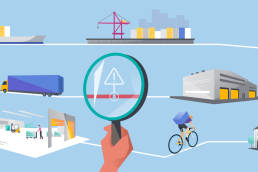The use of location intelligence services has seen significant uptake in recent years. However, its application is moving beyond the traditional uses – such as by logistics firms who use it in planning and coordination.
Location data analysis is also becoming more widely used across the retail, hospitality and advertising. Uber and Deliveroo are prime examples of companies which are built on the central premise of location-based services.
This data-driven approach is constantly evolving and its impact on our day to day lives should not be underestimated. Let’s consider some of the current applications, their implications, and where this could all lead to.
Movement Monitoring
Location data is well-known as a risk assessment tool by government and military contractors. In the US, for example, it’s used in national security to monitor irregular movements by suspected terrorists.
However, the same precise levels of accuracy can also help companies monitor customer behaviour. Take the health insurance industry for example. In a similar way to how car insurers offer discounts for GPS vehicle tracking, in exchange for a more precise or lower premium, customers can give insurers access to their mobile phone or wearable data for a set period – allowing them to track their fitness, health, and locations to provide insight in their movement and their lifestyle choices.
Taking On The Competition
In a similar way, other firms, such as Google, HERE, Qualcomm, AT&T, Intel, and Apple are making significant investments in location intelligence technologies. These solutions providers are integrating real-time location monitoring capabilities in devices – such as smartphones, vehicles, and aircraft – and are taking advantage of location intelligence to grow customer acquisition and make smarter sales and marketing decisions.
Given that mobile phones are basically sensors, businesses can access their dynamic location data – such as information on customers’ whereabouts, their preferences, duration of their stay, and frequency of visits. Dynamic location data also enables organizations to predict the customer behavior and their buying patterns, which can help in better decision making
Many marketers are also using geofencing to serve mobile ads to customers and provide incentives in the vicinity of specific stores.
A classic example of this is when Burger King geofenced McDonald’s stores during its #WhopperDetour campaign. When a customer got within 600 ft of a McDonald’s outlet, they were offered a Whopper for a penny, a redirected to the nearest Burger King restaurant. Such “geo-conquesting” campaigns that rely on GPS technology to create a virtual fence around a predefined area are a promising application for mobile marketers.
While, admittedly somewhat gimmicky, it demonstrates the power of location intelligence when leveraged creatively.
The Greater Good
However, moving beyond commercial applications, location data can be used for the greater good – as governments worldwide consider contact tracing apps to fight Covid-19.
Consider how US pharmacy chain Walgreens’ Flu Index uses location data to monitor the purchase of flu medication. While not being used in relation to Covid-19 specifically, it demonstrates how buying behaviours and location intelligence can work together – or indeed how brands can openly provide access to their data when there’s an opportunity to be of public service.
Looking To The Future
While it’s easy to imagine that the future of location intelligence relates to autonomous mobility, space exploration, and so forth, let’s not forget that it has a very real purpose here and now. As further adoption occurs, the links between our services and devices will strengthen as our relationship to technology and what it enables becomes more harmonious.
Location intelligence and the ways in which our data is collected will continue to evolve at a fast rate as more companies realise the power of using data proactively as part of their wider business strategies. The limitations, it seems, are more human and data privacy-orientated than technology-related. What’s coming next is down to those with the foresight to leverage location intelligence in new and interesting ways.
Looking to get ahead in location intelligence? Need some help and support? Talk to the team on +31 (0)20 70 78 677 or email info@local-eyes.nl



